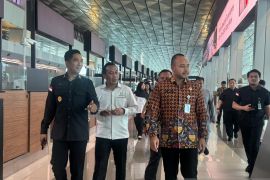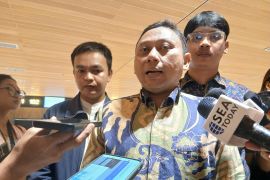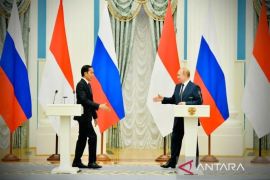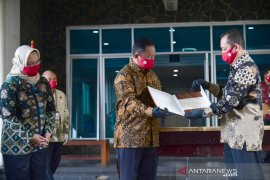The era of Soekarno was an important milestone in the relations between Indonesia and China.Beijing (ANTARA News) - Today, 65 years ago, Indonesia and China officially opened diplomatic relations.
Relations established by Indonesia with China were a reflection of its active independent foreign policy amid the prevailing cold war at that time.
The era of Soekarno was an important milestone in the relations between Indonesia and China. Liu Hong, in his book on China and the Shaping of Indonesia, 1949-1965, said that time China was like a lighthouse to show Indonesia the way where to go and how Indonesia had to be developed.
The model of development in China was discussed by intellectuals. Indonesian newspaper carried Chinas success stories, and even Chinese literature had strong influence on the public.
It was a period of great honeymooning between China and Indonesia. Interaction and exchanges of visits took place not only among the elite but also at the grass root level.
The bilateral relations strengthened with the presence of Prime Minister Zhou Enlai at the Asian African Conference (AAC) in Bandung in April 18-25 in 1955.
In the AAC, the five principles of Live Side by Side in Peace and mutual respect raised by China and sponsored together with the governments of India, Myanmar, won support from the participants of the historical conference.
Indonesia and China agreed to strengthen ties, which were already in good shape at that time marked with the signing of an agreement of friendship and cultural cooperation on April 1, 1961.
In wider context of foreign relations, Indonesia was important for China, which was not yet member of the United Nations. China was no less important for Indonesia, especially after the country decided to abandon its U.N. membership in early 1965. The two countries, therefore, sought to form solidarity among New Emerging Force (NEFO).
Mutually beneficial interactions continue to gain strength in the bilateral relations until October 30 when the ties were suspended ending the honeymooning period in the wake of a failed Communist Coup attempt in Indonesia.
Tokyo encounter
Twenty years later, on 24 February 1989, when President Soeharto met with Chinese Foreign Minister Qian Qichen in Tokyo to attend the burial ceremony of Emperor Hirohito, possibility of normalizing bilateral relations was discussed.
Discussion was resumed in a meeting between Foreign Minister Ali Alatas and his Chinese counterpart Qian Qichen on 4 October 1989 in Tokyo.
The result was on July 3, 1990, the two foreign ministers signed a joint communique on The Resumption of The Diplomatic Ties between The Two Countries in Beijing, followed with the visit by Prime Minister Li Peng to Indonesia to attend the signing of a memorandum of Understanding on Resumption of Diplomatic Ties between the two countries on August 8, 1990.
In the era of Soeharto, normalization of the Indonesian-Chinese relations in early the 1990s had high value for China, which at that time widely denounced by the West over the bloody Tiananmen incident.
President Soeharto made a return visit to China in 14-18 November 1990, and witnessed the signing of the forming of A Joint Commission of Economy, Trade and Technical Cooperation.
Normalization of the bilateral relations progressed by phases leading to ASEAN-China relations and the inclusion of China among ASEAn dialog partners in 1996.
For Indonesia, relations with China are important especially in economy especially after the country was beset by the regional monetary crisis in 1997.
At the same time, the period witnessed the emergence of modern China marked with two digit economic growth rate annually as a result of economic reform initiated by Deng Xiaoping in 1978.
Positive interaction between the two countries continued in the era of President Abdurahman Wahid (Gus Dur). Under Gus Dur, Imlek (Chinese new year) is made an official holiday and various Chinese attributes and symbols are allowed to be displayed in Indonesia.
Gus Dur chose China as his first foreign country to visit as a president. He even proposed the forming of Jakarta-Beijing-New Delhi axis.
China is the worlds most populous country with high economic potentials. "We are the one to lose if we dont have good relations with China," Gus Dur said of his China visit in December 1-3 in 1999.
Gus Durs visit to China marked a new era of promoting the bilateral relations with China agreeing to provide financial assistance and credit facility including financial and tourism cooperation and counter trade in energy, exchanging liquefied natural gas (LNG) with Chinese products.
Under the presidency of Megawati Soekarnoputri the two countries agreed to form an energy forum which constitutes an umbrella for Chinese investment in Indonesia.
Strategic Partner
Progress made in normalizing the bilateral relations was strengthened by President Susilo Bambang Yudhoyono during his two terms of administration. During that period there were two important agreement signed to strengthen the relations including Strategic Partnership signed on April 25 in 2005 and Comprehensive Strategic Partnership signed in October, 2013.
Since then political, defense, security, economic and social cultural relations between the two countries expanded.
The closer relations between the bilateral ties were also shown by the two sides in international forums such as in the Declaration of Conduct of Parties in The South China Sea (DoC) in 2002, including Guidelines for The Implementation of DoC in 2011.
Indonesia and China also agreed to sign the protocol of Southeast Asian Nuclear Weapon Free Zone (SEANWFZ) in 2011. The two most populous Asia Pacific rim countries agreed to make ASEAN as the main driving force in forming a forum for East Asia High Level Meetings.
China has always appreciated and supported any decision taken by ASEAN.
"Relations between Indonesia and China have been 65 years old based on mutual respect and responsibility for maintaining peace and stability in the region," said President Xi Jinping, when welcoming President Jokowi on a state visit to that country at the Peoples Supreme Hall on March 25 in 2015.
Relations between Indonesia and China were the most dynamic in Asia Pacific, the Chinese leader said.
In addition to signing eight cooperation agreements during Jokowis visit, Indonesia and China have continued to create synergy between World Maritime Axis idea of Indonesia and Chinas Maritime Silk Lane.
"We want to give deeper substance as comprehensive strategic partners with more concrete cooperation, to bring about better prosperity for the peoples of the two countries," Jokowi told his Chinese counterpart.
Relations between Citizens
The strength of relations between two nations is not only reflected by intensive interaction between the elites of of the two countries but also between the ordinary member of the communities, observers said.
Interaction between ordinary citizens of the two countries would help determine the dynamics of relations between Indonesia and China, they said.
It is very important for the ordinary members of the communities of the two countries to better understand each other after the bilateral relations suffered a setback with the suspension for two decades.
"We are still Red and White (referring to Indonesian flag) even if we are now far way from Indonesia," said Huang Hui Lan, a Chinese, who was forced to leave his hometown, Takengon, Aceh, in 1967, following political chaos in Indonesia in 1965.
Huang Hui Lan and seven brothers, mother and grandfather, boarded a ship sent to Indonesia by the government of China to evacuate ethnic Chinese to start a new life in their forefathers land.
The woman born on July 7 in 1950 said it was time for the two nations to walk side by side to look forward for a better future.
"Let the dark past be a lesson for us," she said.
The woman showed her love for Indonesia by opening an Indonesian traditional dance studio in Guangzhou.
Similarly strong love for Indonesia was also shown by Kenny Lai, who was forced to leave Jakarta where she was born, in 1966.
"The situation at that time was not easy for us. In Indonesia, the people treated as as enemy. On arrival in China the people looked at us with suspicious eyes especially as China was at that time engulfed by cultural revolution.
Now, Kenny said, good relations between the two countries should be strengthened with more intensive interaction between the members of communities of the two countries.
Chairman of China Overseas Harbin Chi Guo Qiang said there are still many Chinese especially in Harbin knew virtually know nothing about Indonesia.(*)
Reporter: Rini Utami/A. Saragih
Editor: Heru Purwanto
Copyright © ANTARA 2015











